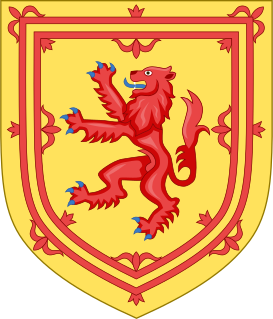 W
WScots law is the legal system of Scotland. It is a hybrid or mixed legal system containing civil law and common law elements, that traces its roots to a number of different historical sources. Together with English law and Northern Irish law, it is one of the three legal systems of the United Kingdom.
 W
WAccession or Accessio is method of original acquisition of property under Scots property law. It operates to allow property to merge with another object, either moveable or heritable (land). Accessio derives from the Roman law concept of the same name. Other jurisdictions employ similar rules. The leading case in this area is said to be Brand's Trustees v Brand's Trustees (1876) 3 R (HL) 16.
 W
WThe Accountant in Bankruptcy (AiB) is the Scottish government agency responsible for administering the process of personal bankruptcy and corporate insolvency, administering the Debt Arrangement Scheme (DAS), and implementing, monitoring and reviewing government policy in these and related areas, for example protected trust deeds and diligence.
 W
WAn Act of Adjournal is secondary legislation made by the High Court of Justiciary, the supreme criminal court of Scotland, to regulate the proceedings of Scottish courts hearing criminal matters. Now primarily derived from the Criminal Procedure (Scotland) Act 1995, the original power to create Acts of Adjournal is derived from an Act of the Parliament of Scotland of 1672. Before promulgation, Acts of Adjournal are reviewed and may be commented upon by the Criminal Courts Rules Council.
 W
WAn Act of Sederunt is secondary legislation made by the Court of Session, the supreme civil court of Scotland, to regulate the proceedings of Scottish courts and tribunals hearing civil matters. Originally made under an Act of the Parliament of Scotland of 1532, the modern power to make Acts of Sederunt is largely derived from the Courts Reform (Scotland) Act 2014. Since 2013, draft Acts have also been prepared by the Scottish Civil Justice Council and submitted to the Court of Session for approval.
 W
WThe Advocates Library, founded in 1682, is the law library of the Faculty of Advocates, in Edinburgh. It served as the national deposit library of Scotland until 1925, at which time through an Act of Parliament the National Library of Scotland was created. All the non-legal collections were given to the National Library. Today, it alone of the Scottish libraries still holds the privilege of receiving a copy of every law book entered at Stationers' Hall.
 W
WThe Alcohol (Scotland) Act 2012 is an Act of the Scottish Parliament, which introduces a statutory minimum price for alcohol, initially 50p per unit, as an element in the programme to counter alcohol problems.
 W
WAlluvion, is a Roman law method of acquisition of heritable property (land). The typical cause is sediment (alluvium) deposited by a river. This sediment, legally termed the accessory, accreses a piece of land, the principal, and thus accedes to the ownership of the principal land over time.
 W
WThe Anglo-Scottish border is a border separating Scotland and England which runs for 96 miles (154 km) between Marshall Meadows Bay on the east coast and the Solway Firth in the west. The surrounding area is sometimes referred to as "the Borderlands".
 W
WAssize is a word sometimes used in Scots law to mean a trial by jury.
 W
WLegal capacity is the ability of an individual to transact with others. It should be distinguished from consent, where the individual with capacity, agrees for another to commit an act involving the consenter, such as consent to sexual relations under the Sexual Offences (Scotland) Act 2009.
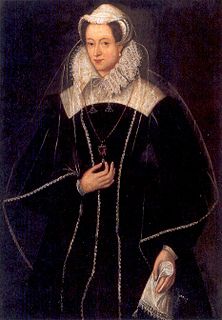 W
WThe Casket letters were eight letters and some sonnets said to have been written by Mary, Queen of Scots, to the Earl of Bothwell, between January and April 1567. They were produced as evidence against Queen Mary by the Scottish lords who opposed her rule. In particular, the text of the letters was taken to imply that Queen Mary colluded with Bothwell in the murder of her husband, Lord Darnley. Mary's contemporary supporters, including Adam Blackwood, dismissed them as complete forgeries or letters written by the Queen's servant Mary Beaton. The authenticity of the letters, now known only by copies, continues to be debated. Some historians argue that they were forgeries concocted in order to discredit Queen Mary and ensure that Queen Elizabeth I supported the kingship of the infant James VI of Scotland, rather than his mother. The historian John Hungerford Pollen, in 1901, by comparing two genuine letters drafted by Mary, presented a subtle argument that the various surviving copies and translations of the casket letters could not be used as evidence of their original authorship by Mary.
 W
WCitizens Advice Edinburgh (CAE), is a registered charity, based in Edinburgh, Scotland. Founded in 1939, Citizens Advice Edinburgh is a member of the Scottish Association of Citizens Advice Bureaux, and provides free, confidential, independent and impartial advice to Edinburgh residents.
 W
WCompulsory purchase are powers to obtain land in Scotland that were traditionally available to certain public bodies in Scots law. Scots law classifies compulsory purchase as an involuntary transfer of land, as the owner of the corporeal heritable property (land) does not consent to the transfer of ownership.
 W
WDiligence is a term in Scots Law with no single definition, but is commonly used to describe debt collection and debt recovery proceedings against a debtor by a creditor in Scottish courts. The law of diligence is part of the law of actions in Scots private law. Accordingly, it is within the devolved competence of the Scottish Parliament.
 W
WThe Diploma in Legal Practice or Diploma in Professional Legal Practice is a Scottish postgraduate qualification required in order to practise law in Scotland, as either a solicitor or an advocate. It is undertaken after completing undergraduate study and before commencing a traineeship.
 W
WA disposition in Scots law is a formal deed transferring ownership of corporeal heritable property. It acts as the conveyancing stage as the second of three stages required in order to voluntarily transfer ownership of land in Scotland. The three stages are:The Contractual Stage The Conveyancing Stage The Registration Stage
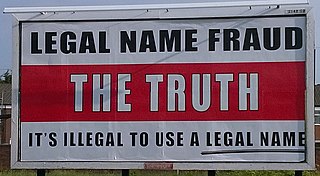 W
WThe freeman-on-the-land (FOTL) movement, also known as the freemen-of-the-land, the freemen movement, or simply freemen, is a loose group of individuals who believe that they are bound by statute laws only if they consent to those laws. They believe that they can therefore declare themselves independent of the government and the rule of law, holding that the only "true" law is their own interpretation of "common law".
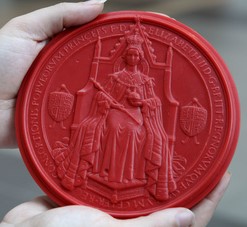 W
WThe Great Seal of Scotland is a principal national symbol of Scotland that allows the monarch to authorise official documents without having to sign each document individually. Wax is melted in a metal mould or matrix and impressed into a wax figure that is attached by cord or ribbon to documents that the monarch wishes to make official. The earliest seal impression, in the Treasury of Durham Cathedral, is believed to be the Great Seal of Duncan II and dates to 1094.
 W
WThe investigation into the bombing of Pan Am Flight 103 began at 19:03 on December 21, 1988 when Pan Am Flight 103 was blown up over Lockerbie in Dumfries and Galloway, Scotland. The perpetrators had intended the plane to crash into the sea, destroying any traceable evidence, but the late departure time of the aircraft meant that its explosion over land left a veritable trail of evidence. The investigation led to the prosecution, conviction, and imprisonment of Abdelbaset al-Megrahi.
 W
WLand registration in Scots law is the system of public registration of land, and associated real rights. Scotland has one of the oldest systems of land registration in the world.Registration of deeds is extremely important as it constitutes the third stage of the creation and transfer on real rights.
 W
WThe Law Society of Scotland is the professional governing body for Scottish solicitors. It promotes excellence among solicitors through the support and regulation of its members. It also promotes the interests of the public in relation to the profession. The Society helps to shape the law for the benefit of both the public and the profession.
 W
WLawburrows is a little-known civil action in Scots law initiated by one person afraid of another's possible violence.
 W
WThe Medical and Dental Defence Union of Scotland (MDDUS) is one of three major medical defence organisations (MDOs) in the UK and offers professional indemnity and expert medico-legal and dento-legal advice for doctors, dentists and other healthcare professionals throughout the United Kingdom. MDDUS is a mutual organisation and was founded in 1902. It is recognised by the UK's General Medical Council.
 W
WThe Minister for Community Safety is a Junior ministerial post in the Scottish Government. As a result, the minister does not attend the Scottish Cabinet. The post was created in May 1999 during the 1st Scottish Parliament as the Deputy Minister for Justice. Deputy ministers were renamed ministers after the election of the Scottish National Party in 2007. The minister reports to the Cabinet Secretary for Justice, who has overall responsibility for the portfolio, and is a member of cabinet.
 W
WThe missives of sale, in Scots property law, are a series of formal letters between the two parties, the Buyer and the Seller, containing the contract of sale for the transfer of corporeal heritable property (land) in Scotland. The term 'land' in this article includes buildings and other structures upon land.
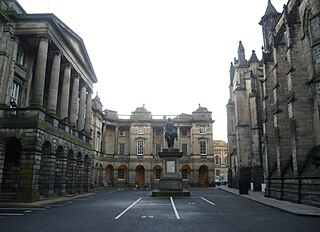 W
WParliament House in the Old Town in Edinburgh, Scotland, is a complex of several buildings housing the Supreme Courts of Scotland. The original building was home to the Parliament of Scotland from 1639 to 1707. It is located in the Old Town, just off the High Street section of the Royal Mile, beside St Giles' Cathedral. It is a Grade A listed building.
 W
WPossession in Scots law occurs when an individual physically holds property with the intent to use it. Possession is traditionally viewed as state of fact, rather than real right and is not the same concept as ownership in Scots law. It is now said that certain possessors may additionally have a separate real right of the ius possisendi. Like much of Scots property law, the principles of the law of possession mainly derive from Roman law.
 W
WPrecognition in Scots law is the practice of precognoscing a witness, that is the taking of a factual statement from witnesses by both prosecution and defence after indictment or claim but before trial. This is often undertaken by trainee lawyers or precognition officers employed by firms; anecdotal evidence suggests many of these are former policemen.
 W
WPrescription in Scots law allows the creation or extinction of personal and real rights. There are two forms of prescription: (1) positive prescription, which creates certain real rights, and (2) negative prescription, which extinguishes both personal and real rights. Prescription is different from limitation, which prevents the raising of court proceedings or litigation in relation to civil law matters in Scottish courts, primarily affecting personal injury claims arising from delict as these are exempt from prescription. The terms prescription and limitation are used in other jurisdictions to describe similar rules, mainly due to shared Roman law and Civil law heritage.
 W
WA privy seal refers to the personal seal of a reigning monarch, used for the purpose of authenticating official documents of a much more personal nature. This is in contrast with that of a great seal, which is used for documents of greater importance.
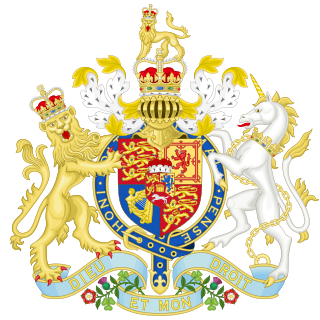 W
WThe Proceedings in Courts of Justice Act 1730 was an Act of the Parliament of Great Britain which made English the obligatory language for use in the courts of England and in the court of exchequer in Scotland. The Act followed a medieval law from 1362, which had made it permissible to debate cases in English, but all written records had continued to be in Latin. It was amended shortly later to extend it to the courts in Wales, and to exempt from its provisions the "court of the receipt of his Majesty's exchequer" in England. It never applied to cases heard overseas in the court of admiralty.
 W
WRegisters of Scotland (RoS) is the non-ministerial department of the Scottish Government responsible for compiling and maintaining records relating to property and other legal documents. They currently maintain 20 public registers. The official responsible with maintaining the Registers of Scotland is the Keeper of the Registers of Scotland. By ex officio, the Keeper of the Registers of Scotland is also the Deputy Keeper of the Great Seal of Scotland. The Keeper of the Registers of Scotland should not be confused with the Keeper of the Records of Scotland.
 W
WThe Scots Law Times is a commercially published law reports service and law magazine for Scotland, publishing over 1400 pages of reports each year. Published weekly during court term by W. Green, the Scots Law Times covers every Scottish court, civil and criminal, from the Sheriff Courts to the Supreme Court of the United Kingdom.
 W
WScots property law governs the rules relating to property found in the legal jurisdiction of Scotland. As a hybrid legal system with both common law and civil law heritage, Scots property law is similar, but not identical, to property law in South Africa and the American state of Louisiana.
 W
WIn Scotland, a baron is the head of a feudal barony, also known as a prescriptive barony. This used to be attached to a particular piece of land on which was situated the caput or essence of the barony, normally a building, such as a castle or manor house. Accordingly, the owner of the piece of land containing the caput was called a baron. According to Grant, there were around 350 identifiable local baronies in Scotland by the early fifteenth century and these could mostly be mapped against local parish boundaries. The term baron was in general use from the thirteenth century to describe what would have been known in England as a knight of the shire.
 W
WStobo is a title in the Baronage of Scotland which takes its name from Stobo in the Scottish Borders.
 W
WHalydean is a Scottish feudal Crown Barony and Lordship in Roxburghshire in the neighbourhood of Kelso, in the Borderlands of Scotland, along the River Tweed. This area along the Tweed is home to the Scottish border clans, including the Armstrongs, Douglases, Elliots, Johnstones, Kers, Moffats, and many others. The Barony and Lordship of Halydean (Holydean) is one of the oldest Norman feudal baronies in Scotland with a living claimant.
 W
WScottish Legal News (SLN) is a free online news service for the Scottish legal sector. Established in 2008, its daily content, distributed online and by email, includes a blackletter case law report as well as law firm announcements, such as appointments and promotions; legislative changes; international human rights stories; and events and job opportunities.
 W
WThe Scottish Public Services Ombudsman Act 2002 is an Act of the Scottish Parliament which establishes an organisation for handling complaints about public services in Scotland. The Act makes provision for an officer, known as the Scottish Public Services Ombudsman, to be appointed and outlines functions to be exercised.
 W
WA Scottish statutory instrument is subordinate legislation made by the Scottish Ministers or a regulatory authority in exercise of powers delegated by an Act of the Scottish Parliament. SSIs are the main form of subordinate legislation in Scotland, being used by default to exercise powers delegated to the Scottish Ministers, the Lord Advocate, the High Court of Justiciary, the Court of Session, and the Queen-in-Council.
 W
WIt is a central tenet of the EU maritime policy that all seas have a particular nature, defined by their geography, their ecology, their economies and their people. Most seas are nested and do not, except for specific purposes such as hydrography or fisheries management, have sharp, recognised boundaries. One important sea for purposes of fisheries management is referred to as the "seas West of Scotland". In line with the EU maritime policy, the sea does not only encompass the waters but also the people and economy of the areas bordering that sea.
 W
WA sheriffdom is a judicial district in Scotland, led by a sheriff principal. Since 1 January 1975, there have been six sheriffdoms. Each sheriffdom is divided into a series of sheriff court districts, and each sheriff court is presided over by a resident or floating sheriff. Sheriffs principal and resident or floating sheriffs are all members of the judiciary of Scotland.
 W
WMadeleine Hamilton Smith was a 19th-century Glasgow socialite who was the accused in a sensational murder trial in Scotland in 1857.
 W
WSee also, laird and False titles of nobility
 W
WThe Statute Law Revision (Scotland) Act 1906 is an Act of the Parliament of the United Kingdom.
 W
WThe Statute Law Revision (Scotland) Act 1964 (c.80) was an Act of the Parliament of the United Kingdom of Great Britain and Northern Ireland.
 W
WSutherland's Law is a television series made by BBC Scotland between 1973 and 1976.
 W
WUltimus haeres is a concept in Scots law where if a person in Scotland who dies without leaving a will and has no blood relative who can be easily traced, the estate is claimed by the Queen's and Lord Treasurer's Remembrancer on behalf of the Crown. It is one of two rights to ownerless property that the Crown possess, the others being bona vacantia.